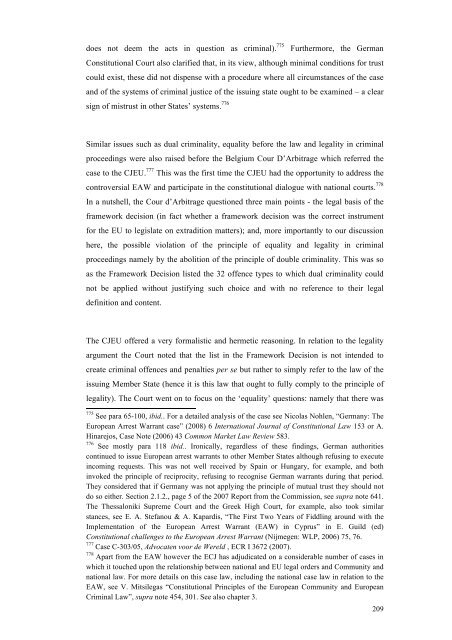The evolution of European Union criminal law (1957-2012)
The evolution of European Union criminal law (1957-2012)
The evolution of European Union criminal law (1957-2012)
Create successful ePaper yourself
Turn your PDF publications into a flip-book with our unique Google optimized e-Paper software.
does not deem the acts in question as <strong>criminal</strong>). 775 Furthermore, the German<br />
Constitutional Court also clarified that, in its view, although minimal conditions for trust<br />
could exist, these did not dispense with a procedure where all circumstances <strong>of</strong> the case<br />
and <strong>of</strong> the systems <strong>of</strong> <strong>criminal</strong> justice <strong>of</strong> the issuing state ought to be examined – a clear<br />
sign <strong>of</strong> mistrust in other States’ systems. 776<br />
Similar issues such as dual <strong>criminal</strong>ity, equality before the <strong>law</strong> and legality in <strong>criminal</strong><br />
proceedings were also raised before the Belgium Cour D’Arbitrage which referred the<br />
case to the CJEU. 777 This was the first time the CJEU had the opportunity to address the<br />
controversial EAW and participate in the constitutional dialogue with national courts. 778<br />
In a nutshell, the Cour d’Arbitrage questioned three main points - the legal basis <strong>of</strong> the<br />
framework decision (in fact whether a framework decision was the correct instrument<br />
for the EU to legislate on extradition matters); and, more importantly to our discussion<br />
here, the possible violation <strong>of</strong> the principle <strong>of</strong> equality and legality in <strong>criminal</strong><br />
proceedings namely by the abolition <strong>of</strong> the principle <strong>of</strong> double <strong>criminal</strong>ity. This was so<br />
as the Framework Decision listed the 32 <strong>of</strong>fence types to which dual <strong>criminal</strong>ity could<br />
not be applied without justifying such choice and with no reference to their legal<br />
definition and content.<br />
<strong>The</strong> CJEU <strong>of</strong>fered a very formalistic and hermetic reasoning. In relation to the legality<br />
argument the Court noted that the list in the Framework Decision is not intended to<br />
create <strong>criminal</strong> <strong>of</strong>fences and penalties per se but rather to simply refer to the <strong>law</strong> <strong>of</strong> the<br />
issuing Member State (hence it is this <strong>law</strong> that ought to fully comply to the principle <strong>of</strong><br />
legality). <strong>The</strong> Court went on to focus on the ‘equality’ questions: namely that there was<br />
775 See para 65-100, ibid.. For a detailed analysis <strong>of</strong> the case see Nicolas Nohlen, “Germany: <strong>The</strong><br />
<strong>European</strong> Arrest Warrant case” (2008) 6 International Journal <strong>of</strong> Constitutional Law 153 or A.<br />
Hinarejos, Case Note (2006) 43 Common Market Law Review 583.<br />
776 See mostly para 118 ibid.. Ironically, regardless <strong>of</strong> these findings, German authorities<br />
continued to issue <strong>European</strong> arrest warrants to other Member States although refusing to execute<br />
incoming requests. This was not well received by Spain or Hungary, for example, and both<br />
invoked the principle <strong>of</strong> reciprocity, refusing to recognise German warrants during that period.<br />
<strong>The</strong>y considered that if Germany was not applying the principle <strong>of</strong> mutual trust they should not<br />
do so either. Section 2.1.2., page 5 <strong>of</strong> the 2007 Report from the Commission, see supra note 641.<br />
<strong>The</strong> <strong>The</strong>ssaloniki Supreme Court and the Greek High Court, for example, also took similar<br />
stances, see E. A. Stefanou & A. Kapardis, “<strong>The</strong> First Two Years <strong>of</strong> Fiddling around with the<br />
Implementation <strong>of</strong> the <strong>European</strong> Arrest Warrant (EAW) in Cyprus” in E. Guild (ed)<br />
Constitutional challenges to the <strong>European</strong> Arrest Warrant (Nijmegen: WLP, 2006) 75, 76.<br />
777 Case C-303/05, Advocaten voor de Wereld , ECR I 3672 (2007).<br />
778 Apart from the EAW however the ECJ has adjudicated on a considerable number <strong>of</strong> cases in<br />
which it touched upon the relationship between national and EU legal orders and Community and<br />
national <strong>law</strong>. For more details on this case <strong>law</strong>, including the national case <strong>law</strong> in relation to the<br />
EAW, see V. Mitsilegas “Constitutional Principles <strong>of</strong> the <strong>European</strong> Community and <strong>European</strong><br />
Criminal Law”, supra note 454, 301. See also chapter 3.<br />
209
















